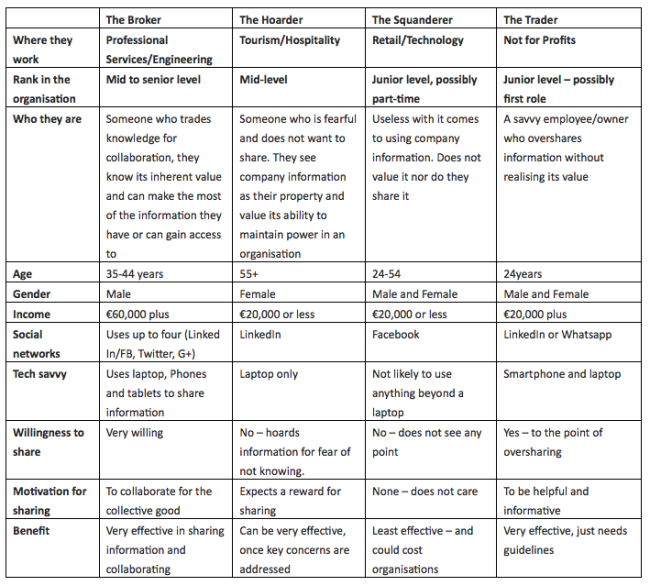A study into information sharing in Irish organisations has found that 79pc of workers feel that company information should be shared equally within their organisation, but 57pc feel colleagues hoard information for personal advantage.
A Microsoft-sponsored Amárach study looked at how Irish employees use, share and communicate company information within their organisations.
It found that 48pc of employees feel that enterprise social technologies like Yammer would lead to better collaboration and avoid wasting precious internal company, customer and competitor information.
“Traditionally, we have shared information in a formal, more structured approach but using social media, the way that many of our employees interact in their daily lives, has democratised access to and delivery of information,” Ian Slattery, Director in Accenture’s Technology Practice said.
“For example, in global organisation that employees over 250,000 people, we have a lot of valuable information all over the world but it can be difficult to identify at speed.
“By using Yammer, I can reach out to a global community quickly and easily and my experience so far suggests that the information I require gets to me in a very timely manner. In addition, because you’re dealing with individuals, most of the time it means that you’ve also made a valuable contact.”
Four personality types when it comes to sharing information
The study discovered four distinct personalities when it comes to how information is managed and shared in organisations.
The broker is someone who who trades knowledge for collaboration, they know its inherent value and can make the most of the information they have or can gain access to. According to the research, they are most likely male, aged between 35-44 years old and earn over €60,000 per annum.
The hoarder is someone who gathers, but does not want to share company information for the sake of maintaining power or fear of missing out. They are mid-level management aged 55 years or older and more likely to be female. Their average income would be over €20,000.
The squanderer is someone who neither uses or shares company information. They would be junior to mid-level in an organisation, and possibly part time, are equally likely to be male or female on an annual income of €20,000 or less and aged between 24-54 years.
The trader tends to overshare information without realising its inherent value. Most likely to be early in their career and aged 24 year earning around €20,000 per year.
When asked what category they fitted into, 82pc felt they were brokers, and did a great job of sharing information.
However, when they were asked to rate their colleagues, 50pc felt that others were brokers and that 31pc were squanderers of information.
Interestingly, employees in small organsiations (1-5 employees) are far more likely to share competitor or marketing information for mutual benefit. Employees of larger companies (250+) shared company and HR info.
How information gets shared
In terms of how information gets shared, 81pc use face to face interactions (48pc felt this was effective), some 68pc use email (30pc believe this is effective) and 60pc rely on phones to share information (only 4pc believe this to be effective).
The study found that 41pc of workers want a centralized system for storing information.
Some 50pc of respondents have tried various types of shared drives and networks, with only 8pc saying they found these useful due to lack of training or encouragement by their organisation.
“Microsoft has been studying how to enable collaboration and communication by using social tools to help businesses be more competitive by allowing people to work in a familiar way,” said Mike Hughes, Business Group Lead, Office Division, Microsoft.
“Traditional work is no longer working, and is encouraging hoarders and squanderers, who could be undermining your business.
“A Gallup report in 2013 showed that 87pc of global employees are not engaged with their jobs. Your employees and colleagues are disconnected in. We have seen how shared knowledge can drive a common purpose.
“Organisations need to create a culture of sharing, backed up by technology that creates a common space where information becomes social, shared and accessible.
“Enterprise Social Solutions like Yammer can create this safe haven where information, insights and timely actions are shared across an organisation liberating it from a shelf or an email inbox,” Hughes said.

Office politics image via Shutterstock